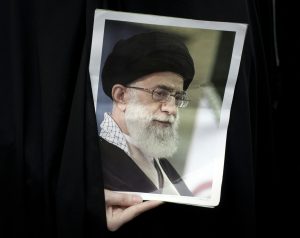[montrealgazette.com]
BY KYLE MATTHEWS, SPECIAL TO THE GAZETTE JUNE 10, 2014

Photograph by: Behrouz Mehri , AFP/Getty Images
MONTREAL — Iran is often in the news because of its suspected nuclear-weapons program. A nuclear Iran certainly poses a threat to international peace and security, which is why the international community imposed economic sanctions against Tehran. But what if the country’s nuclear agenda wasn’t the only threat to world stability?
The treatment and persecution of minorities within Iran is a serious problem that does not receive equal news coverage and scrutiny by the media. There are way too many prisoners of conscience rotting away in Iran’s prisons.
For the most part, these are intelligent and dedicated people who only wish to better their country, but whose voices are muffled by repression and imprisonment. Having views contrary to those of the government can be very costly. Even worse, simply choosing to practise a different faith than the state religion (its version of Islam) can lead directly to a prison sentence.
This is what has happened to thousands of Baha’is over the past few decades. The execution of more than 200 Baha’is in the mid-1980s spurred an international outcry that eventually led to a halt in killings. But the persecution of Baha’is has not stopped. It’s more insidious, and not as overtly shocking, but no less worthy of attention.
More than 100 people of the Baha’i faith are now behind bars, imprisoned solely on religious grounds. Among them are the seven leaders of this religious community. This spring marks the sixth year of their imprisonment, on false charges, and they are not about to get out. They all received 20-year sentences. The Baha’i community is Iran’s largest religious minority, and yet government policy seems designed to oppress all its members.
Equally troubling is that even their dead are not left alone. The Iranian government has recently authorized the excavation of a Baha’i cemetery in the southern city of Shiraz with the goal of building a sports complex. But the tombs in this cemetery are not ordinary. It is the final resting place of 10 courageous women who were executed for their beliefs in 1983, at the height of persecution against Baha’is in the country.
Many of the women were in their 20s, and one, Mona Mahmudnizhad, was just 17. She was killed by hanging, after being tortured.
Now, three decades later, her remains are being attacked, in what seems to be a continuing attempt to erase the memory of her and her cohort’s sacrifice. With laws in place that prevent Baha’is from attending university, it is difficult not to see these actions in Shiraz as being part of a larger strategy by the government to erase the symbols of the Baha’is from Iranian society, and to make life as miserable as possible for them.
While nukes capture the attention of national governments, and for good reason, we should also worry about the treatment of religious minorities and the importance of their security. How a country treats its own citizens is often a harbinger of what it intends to do outside its borders.
It is Canada’s responsibility to work toward strengthening international human-rights norms and assisting those suffering the denial of their basic rights. While most members of the international community agree that freedom of religion and liberty of conscience have to become valid human rights in the Islamic Republic of Iran, it is of prime importance that governments speak out regarding the contemporary persecution of the Baha’is in the country.
Faces and names matter when it comes to mobilizing public opinion against a regime that preys upon both the living and the dead.
Kyle Matthews is a Fellow at the Canadian Defence and Foreign Affairs Institute. He lives in Montreal.
June 14, 2014 3:38 am
And how many Christians are in the same boat…
June 14, 2014 11:33 pm
Not nearly as many. Baha’is are more numerous in Iran than Christians, Jews and Zoroastrians put together. Most of the Christians are Armenians, about half of whom immigrated to Armenia when it became independent. However, the number of Christians in Iran overall has increased because a lot of Assyrian Christians have been migrating from Iraq where the situation for Christians right now is much worse. The only Christians in Iran that have been persecuted are those accused of having converted from Islam, who evangelize to Muslims, or those who belong to home churches that the government finds suspect. I won’t say Christians have equal rights in Iran, but unlike Baha’is they do have some rights.
June 16, 2014 10:04 pm
Unfortunate fact: Religious minorities suffer tremendously in all countries that are majority Muslim. Out of 52 Muslim majority nations in the world, I would like to know if there is any that actually respect all religious minorities in their constitution and allow their citizens proper Human Rights.